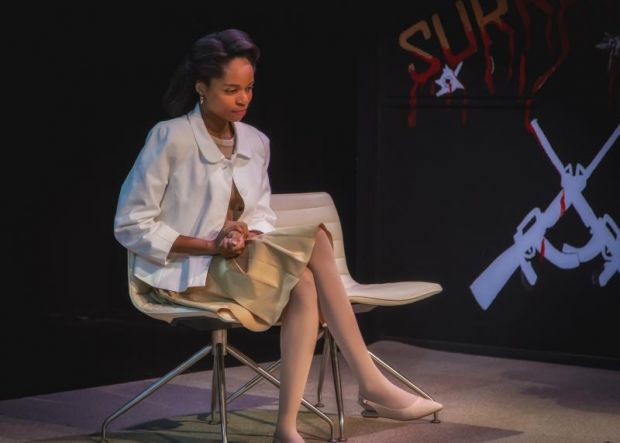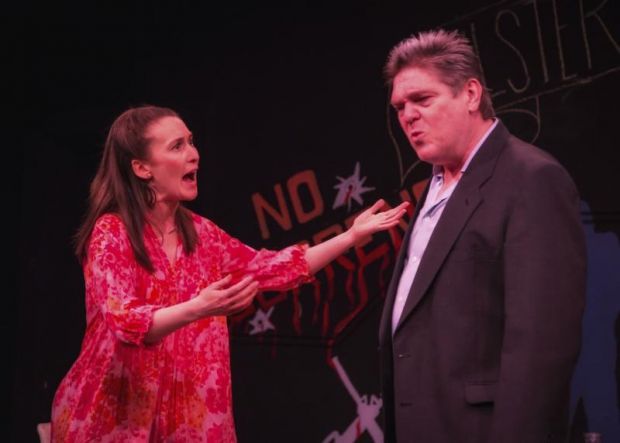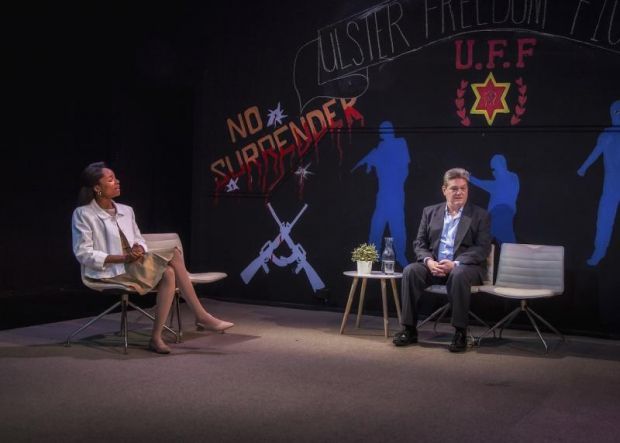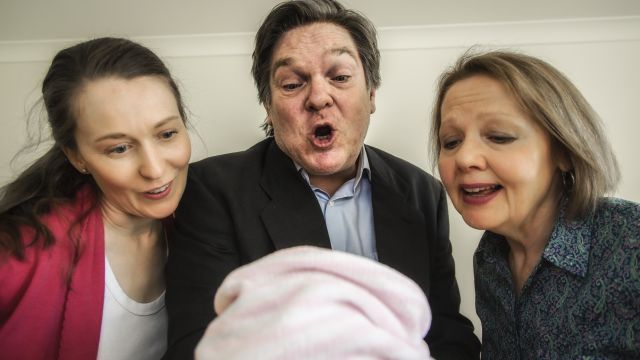Cyprus Avenue
Our knowledge of ‘The Troubles’ in Northern Ireland might be reduced to a few gable-end murals and U2 singing ‘Sunday, Bloody Sunday’, but there is a deep and dark history that evolved the institutionalised hatred from Unionists to Republicans and vice versa. Fortunately for the audience at Red Phoenix’s production of David Ireland’s play, there are explanatory notes on the history and terminology. It’s set two decades after ‘peace’ was brokered in the Good Friday Agreement, so nothing prepares you for the violence – verbal and otherwise – that comes from the uncompromising performances and aggressive direction from Nick Fagan.
Brant Eustice is Eric. Living well on Cyprus Avenue, Belfast - a wide, tree-lined, old-money and very English street, far from conflict – he doesn’t care much for his new granddaughter. In fact, never has cared much for kids, even his own daughter was ignored until he could talk to her like an adult. He carries a haunted look that he explains is caused by not sleeping well, but his horror is plain to see when he is convinced the newest member of the family looks like Gerry Adams, the then President of the political arm of the ‘other side’.

It's an enormous and brilliant performance from Eustice, struggling with his identity as a man, a Unionist, a Protestant, who lives in the island of Ireland but isn’t Irish. There are speeches on national identity, racial stereotyping, the relationship between organised religion and personal faith, the impacts of colonialism, even his own sexuality. The themes are just as pertinent in a different land and time: Gerry Adams could be Trump; Ireland could be Australia, or Ukraine, Gaza, a dozen other places in conflict where both sides claim the problems are not ‘us’, but ‘them’. The challenge is that what was certain and ‘right’ might no longer be either, and the fear is that the blame is our own.
Eric is a man who grew up with certainty as to who and what he is - was, and now none of that makes any sense. And he has no idea what the future holds and where – if – he fits within it. His fight to reclaim his identity starts with him being an old bigot, then breaks down into a mental episode, that collapses to psychotic behaviour. It’s traumatic to watch Eustice go through this: from his haunting expression whilst he tries to explain his reality to everyone, to his face wetted with real tears, unable to reconcile the logical actions inside his world with the awful atrocities he has committed in this world.

Despite the strong persona of Eric, the other characters are stereotypes, and only serve to be on the receiving end of Eric’s verbal and physical violence through his psychosis: Rhoda Sylvester is the standout as the beautifully patient psychotherapist attempting to guide Eric through an explanation of the awful events. Both Emily Currie and Lyn Wilson are great as his daughter and wife, but they aren’t given much to do other than react to Eric’s vitriol. Brendan Cooney, as Slim, a volunteer terrorist (Unionist, Eric’s side), is his devil’s advocate, challenging Eric’s statements, offering alternatives, taking them both along the ‘what if?’ tangents. But even Slim is in Eric’s head, according to the therapist, reinforced by a humorous exchange that conflates the two times and places. Cooney enjoys this role – serious, dark, but still comic – and when Slim is asked to look at the baby and tell Eric it’s the sworn enemy, he offers the wonderfully piercing line: ‘All I can see is you’. Yet two minutes earlier he’s trying to burst blood vessels in his head as he attempts a world record for the number of ‘C’ words in two minutes.
Fagan has the local cast with effective Belfast accents, and these add to the verbose dialogue, rather than distract. He also designed the simple set: a plush white carpet (against which, blood stands out very well), neutral chairs, and the walls of the theatre daubed in Unionist murals and slogans lifted from Belfast’s Falls Road or Derry’s Bogside. Richard Parkhill’s lighting defines the coolness of a therapist’s office distinct from the warm tones of a comfortable family home. Sean Smith’s sound design adds much to the atmosphere, with the sound and light working in harmony to cut in and out of time and place – the audience always knows where and when we are.

The ending is inevitable – it’s signposted from the very start, and that is part of the appeal: that you know what’s coming, if not how, and however horrific it could be, you can’t do anything about it except watch. Yet the horror is muted by just how long it takes to play out. There’s genuine tension through a lot of the narrative, but by the time the lights fade on the atrocities, there is a numbness from the overexposure; there’s nothing left to the imagination. Ireland’s writing can be a little self-indulgent – Eric’s speeches on Catholics and a night in an Irish pub in London are alternately hilarious and disgraceful but are in danger of turning into a stand-up routine. The play’s themes and messages start sharp, but are blunted through its thesauric verbosity and over-explosive exchanges.
Six months ago, Holden Street saw another David Ireland play, Ulster American, also concerning issues of identity and present-day interpretation of what happened (and continues to happen) in Northern Ireland – and also ending in extreme violence (Ireland admits he finds it hard to end his plays without it). It’s courageous for two different theatre companies to bring stories of The Troubles, to tell those stories, perhaps encourage us to find the parallels with our own history and future. Red Phoenix Theatre says that it will focus on plays that have something to say and provoke discussion: this confronting production will certainly achieve the latter.
Mark Wickett
Photographer: Richard Parkhill
Subscribe to our E-Newsletter, buy our latest print edition or find a Performing Arts book at Book Nook.

